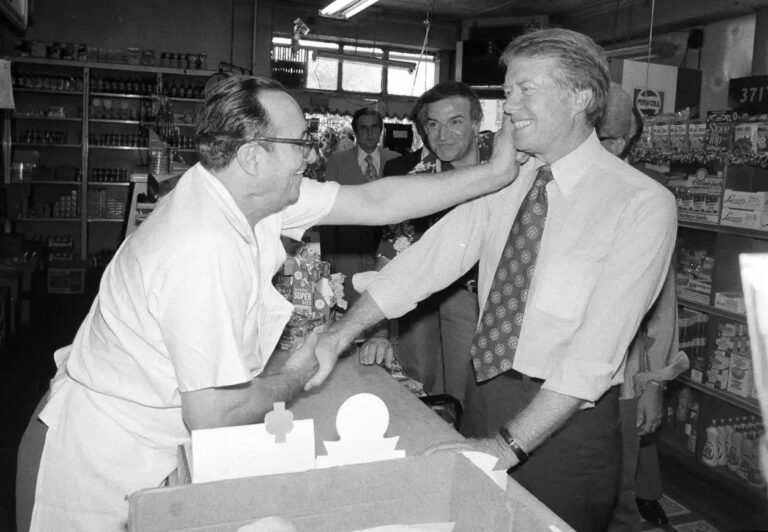Jimmy Carter, the 39th president of the U.S., will long be remembered for actions taken during his presidency that spanned 1977 through 1980. Among his historic actions were the transfer of control of the Panama Canal to the Republic of Panama, the signing of a peace accord between enemies Egypt and Israel and the establishment of normal diplomatic relations with China.
Carter’s legacy, however, was marred by historic high inflation, interest and unemployment rates and by the Iranian takeover of the U.S. embassy in Tehran in November 1979 that included the taking of 53 hostages. Exactly one year later, as the hostage crisis remained unsolved, Carter lost his bid for a second term when Ronald Reagan was elected to replace him.
Carter was a champion of free-market economics and called for government deregulation of transportation industries to promote competition and reduce rates.
One result, the Motor Carrier Act of 1980, changed trucking as we knew it. Carter’s goal of reduced freight rates due to increased competition was achieved, but that competition resulted in the demise of hundreds of motor carriers, many of them unionized. Driver pay plummeted as well, while the current boom and bust freight cycle in the trucking industry was born.
Prior to deregulation, trucking companies applied for routes from the Interstate Commerce Commission (ICC) and were required to submit proof that the route was needed. If the applicant could show that the route was new or that the carrier serving the route wasn’t able to handle the demand, authority might be granted, but only for specific products. Before that happened, however, the ICC would notify current carriers, giving them the opportunity to increase service to the area before adding new truckers.
Carriers who already serviced a territory could file objections to each application and did so frequently in an effort to quash competition. Even when authority was granted, it was often tightly restricted with the carrier prohibited from adding additional stops, for example. Each carrier was required to file rates with the government 30 days prior to the effective date, and those rates couldn’t be lower than already-established rates.
A new carrier could purchase an existing route or territory from another carrier, but the price was often astronomical, and any agreements had to be approved by the ICC. The system was cumbersome, expensive, and corrupt.
The Motor Carrier Regulatory Reform and Modernization Act, commonly known as the Motor Carrier Act of 1980, eliminated most of the restrictions on cargoes that could be carried and allowed carriers to publish their own rates. Routes or territories were completely deregulated, so that almost any carrier could serve any territory desired. Entry into the freight marketplace became much easier, and many current carriers can point to an expansion of their fleets after the law was passed.
Carter signed the bill into law on July 1, 1980.
“The Motor Carrier Act of 1980 will bring the trucking industry into the free enterprise system, where it belongs,” he said at the signing. “It will create a strong presumption in favor of entry by new truckers and expanded service by existing firms.”
During his administration, laws were passed deregulating the airline and rail industries as well as trucking. These laws, according to an October 1 article by Phil Gramm published in the Wall Street Journal, “unleashed competition and spawned the invention and innovation that gave America the world’s most efficient transportation and distribution system.”
The WSJ article credited the Motor Carrier Act of 1980 with reducing the cost of moving goods, as a share of the U.S. gross domestic product, by 50%. Fred Smith, founder and now-retired CEO of Federal Express (now FedEx) said that Carter was unappreciated for his leadership in these efforts, adding, “These farsighted changes were the great achievement of the Carter presidency.”
Unquestionably, there were negative consequences resulting from the Act. As increased competition drove freight rates downward, large carriers, many of them unionized, could not compete with the lower rates.
Some familiar carriers of the early 70’s such as Consolidated Freightways (CF), Pacific Intermountain Express (P.I.E.) and Transcon Lines eventually closed their doors. Campbell’s 66 Express, the carrier with camel character “Snortin’ Norton” on each trailer with the company’s motto “humpin’ to please” lasted six years into deregulation.
It’s interesting that a president from a political party that is known for being pro-union would support legislation that severely impacted union membership numbers, but Carter was conservative in many of his viewpoints. His determination to reduce government control wouldn’t be popular in his party today. He chose to put the country ahead of political affiliations.
Driver pay and benefits were driven downward by regulation, too. An analysis by Business Insider showed that median wages for truck drivers have declined by 21% since 1980, with sharper declines in some areas. An annual truck driver salary of $38,000 in 1980 would be worth nearly $145,500 in today’s dollars, when inflation is factored in. There are few drivers earning that amount today as some carriers struggle to hire enough drivers to keep their trucks running.
Carter’s far-sighted goal of increased transportation competition has been transformative in the U.S. economy. More choices in carriers, as well as reduced rates, has been credited with the creation of “big box” stores that are common today, such as Walmart, Home Depot and others. Cheaper freight rates help keep the cost of consumer commodities lower, helping the economy grow while also helping to curb inflation, two goals that Carter mentioned at the bill signing.
Today’s trucking industry has undergone many changes in the past 35 years, but none as impactful as the deregulation Carter signed into law in 1980.
Cliff Abbott is an experienced commercial vehicle driver and owner-operator who still holds a CDL in his home state of Alabama. In nearly 40 years in trucking, he’s been an instructor and trainer and has managed safety and recruiting operations for several carriers. Having never lost his love of the road, Cliff has written a book and hundreds of songs and has been writing for The Trucker for more than a decade.
















Great article, Cliff. Happy New Year.
I finally found a decent article explaining Carter’s deregulation. Thanks Cliff!